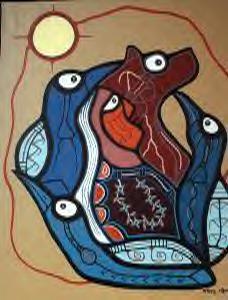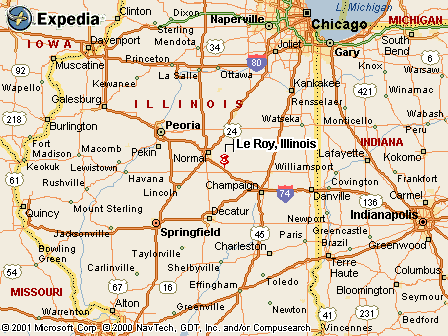|
|
Canku Ota |
|
|
(Many Paths) |
||
|
An Online Newsletter Celebrating Native America |
||
|
June 30, 2001 - Issue 39 |
||
|
|
||
|
Elder Brings Pride to Kickapoo |
||
|
by Al Swanson UPI News |
||
|
art Elder's Teach by Roy Thomas |
 LE ROY, IL, June 14 (UPI) -- When Marguerite Salazar was a girl she heard stories about her tribe's
life in central Illinois and the forced relocation of the Kickapoo in the 1800s from her grandparents and parents. LE ROY, IL, June 14 (UPI) -- When Marguerite Salazar was a girl she heard stories about her tribe's
life in central Illinois and the forced relocation of the Kickapoo in the 1800s from her grandparents and parents."They walked from here to Mexico," said Salazar, who at 108 is one of the oldest living American Indians. "There were some horses, but they walked." Kendall Scott, 35, her grandson and a full-blood Kickapoo who learned the tribe's language from his late parents in McLoud, Okla., did the interpreting for the tiny, white-haired Salazar, who speaks native Kickapoo, an Algonquin language, and a little Spanish. Salazar was born in the small Mexican village of Eagle Pass around 1893, and lives in Nacimiento, Mexico, with about 800 other Kickapoo. Tribal leaders estimated her age at 106 although an identity card issued by the Bureau of Indian Affairs agency in Shawnee, Okla., listed her birthday as May 3, 1897, which would make her 104. In any case they said she is the oldest member of the tribe, which numbers between 6,000-7,000. Asked whether her ancestors left Illinois voluntarily, she shook her head "no." "Forced," she said. The Kickapoo were sent to Kansas, Oklahoma, Texas and Mexico after the Black Hawk War of 1832 and did not re-establish a presence in Illinois until 1998 when McLean County residents blocked plans for a mega-hog farm outside the town of Le Roy, population 3,200. Landowners Bill and Doris Emmett welcomed the tribe back to land the Indians had occupied since the 1700s and opened The Grand Village of the Kickapoo Park, a non-profit one-acre site where native plants and grasses, and a herd of buffalo were to be restored. In the summer of 1998, about 6,000 people gathered over two days for the opening of the now 2.3-acre park. Salazar, whose Kickapoo name "Kikakwa" means "Trees That Cover," danced at that first powwow and the tribe honored her as their elder of elders. Only a couple of hundred people braved cold rain to attend this year's powwow, June 2-3, and many of the activities were moved into a large tent. Salazar, supported by a cane and two men, danced a few traditional steps. Tribal members respectfully called her "grandmother" for providing a living link between tribe's home in Illinois and those relocated west and south nearly 170 years ago. The powwow was set up in a sacred circle to bring scattered people closer together as they celebrated the end of one season and the beginning of the next, tribe members said. It's a time to thank the creator for the blessings of the past season and to ask for continued blessings in the next. It was also a time of song, music and storytelling. Kikakwa was honored as elder and given gifts like blankets, prints and sketches of eagles and a $345 offering to help pay for the cost of her flight from Mexico -- her first trip on an airplane. "She thought she was getting on a bus," Scott joked. "I'm going to work with them next year to bring back a lot more Kickapoo and have our own traditions, drumming and songs," said Scott, a former chairman of the tribe in Oklahoma. Ken Collier, deputy chairman of the Kickapoo Tribe of Oklahoma, which has about 3,000 members, said the band operates slot-machine-only gambling near McLoud and would help support cultural efforts of the Kickapoo in Illinois. He estimated there are about 500 Kickapoo in Texas, a like number in Kansas and about 1,000 in Mexico. Salazar received proclamations from the Illinois Senate and Gov. George Ryan, who wished her a wonderful 108th birthday in his citation. "She is the link for the ... Kickapoo," said Joseph Standing Bear Schranz, a White Earth Ojibwe and president of the Midwest Soarring Foundation who lives in Westchester, Ill., near Chicago. "Grand Village was the largest Kickapoo stronghold in this state," he said. "They stayed here until the 1830s. ... There are burial sites in this area." Schranz said the foundation had been given nearly 40 acres of land 30 miles south of Springfield, the state capital, and hoped to re-establish a native village and open a learning and cultural center. The Kickapoo lived a peaceful, agrarian existence on the land for more than 150 years in wikiups, bark and reed structures attached to poles. A 300-foot-by-180-foot log stockade built by white settlers in 1750 just east of the Kickapoo village was never needed for protection from Indians, who taught the settlers how to cultivate corn, squash, beans and native tobacco in the rich prairie land. The fort was destroyed during the War of 1812 and the logs burned for firewood. |
|
|
|
Kickapoo History |
|
Kickapoo Language |
|
|
||
|
|
||
| Canku Ota is a free Newsletter celebrating Native America, its traditions and accomplishments . We do not provide subscriber or visitor names to anyone. Some articles presented in Canku Ota may contain copyright material. We have received appropriate permissions for republishing any articles. Material appearing here is distributed without profit or monetary gain to those who have expressed an interest. This is in accordance with Title 17 U.S.C. section 107. | ||
|
Canku Ota is a copyright © 2000, 2001 of Vicki Lockard and Paul Barry. |
||
|
|
|
|
|
The "Canku Ota - A Newsletter Celebrating Native America" web site and its design is the |
||
|
Copyright © 1999, 2000, 2001 of Paul C. Barry. |
||
|
All Rights Reserved. |

